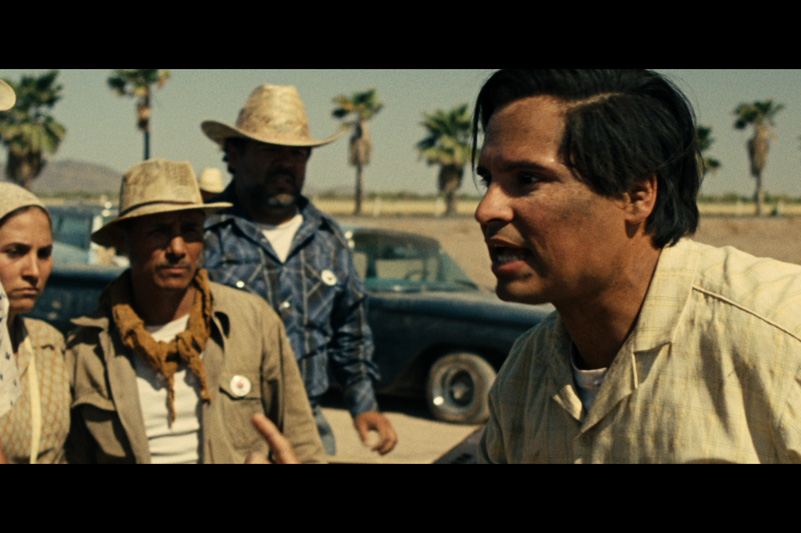
A Man in Part: Cesar Chavez and the Perils of the Biopic
A version of this story ran in the July 2014 issue.
Above: Michael Peña stars in Cesar Chavez.
The political biopic might be the most perilous of all movie genres. If you have a director and a writer whose ideologies run counter to those of their subject, the movie risks becoming little more than a hatchet job with a straw man protagonist. Even more dangerous is when a film’s creators are so firmly in their subject’s ideological corner that all sense of objectivity, perspective and proportion goes out the window, turning a cinematic hero into an actual one and drowning his or her failings, moral and otherwise, in reverence. The lives of saints make for exceedingly dull movies.
The solution is simple enough: Acknowledge your hero’s frailties, but celebrate them as the inevitabilities of being a living, breathing human being. Conservatives continue to argue that the sexual preferences and peculiarities of Martin Luther King Jr. and Mohandas Gandhi compromised their achievements as moral leaders, but the opposite is true. The fact that these men were flesh-and-blood people only amplifies the magnitude of their achievements.
Cesar Chavez, the Mexican-American labor leader who’s right up there with King and Gandhi as one of the civil rights giants of the 20th century, wasn’t troubled by the kind of carnal indulgences that dog the legacies of those men, but that doesn’t mean he was perfect. During his years as the leader of the United Farm Workers union he was given to bursts of autocratic domineering: crushing dissent, silencing critics, even purging members who displeased him. He was also famously hostile to Mexican migrant workers and illegal immigration. Knowing that the farm owners of central California replenished their fields with illegal immigrants any time the UFW organized a strike, Chavez and his union reported undocumented workers to authorities and picketed the INS demanding crackdowns. The UFW even set up human barricades called “wet lines” on the border to keep undocumented Mexican laborers from crossing into California to work. During one incident, union members resorted to violence when Mexican workers refused to turn back.
None of this shows up in Cesar Chavez, the new film from director Diego Luna, which is a shame. Acknowledging the presence of moral ambiguity in Chavez’s history and in his heart could only have made his character, and the movie, more compelling. Cinema can only be improved by digging into the darker corners of a character’s motivations and actions. Viewers may walk out of your movie liking your protagonist less, but they’ll understand him, and identify with him, more.
As it stands, the film (which is being released on DVD this month) is a thoroughly mixed bag. Ideologically, it’s a whitewash: Chavez was a great man who did great things and that’s that—join the chorus and get to singing. But while Luna and screenwriter Keir Pearson are careful to steer clear of the darker side of the Chavez story, they don’t turn him into a statue of righteousness either, thank god. Cesar Chavez doesn’t shy from examining the price a person must pay to become the kind of hero about whom people make reverent movies. Actor Michael Peña’s Chavez isn’t particularly lovable or charismatic; he’s single-minded and stubborn, blithely sacrificing the happiness of his wife and children for the greater good.
At the heart of this dilemma is Chavez’s relationship with his oldest son, a teenager tormented by his father’s decisions, suffering from racism and bullying when Chavez moves the family from Los Angeles to the predominantly white farming community of Delano. Blindly and repeatedly, Chavez leaves his son alone and exposed in a world of hatred, doing nothing as his son first seeks solace, then disassociates until he all but disappears.
This, I guess, is the dark side of greatness: the sacrifices others have to make for the sake of your legacy. Where Cesar Chavez breaks out of the aesthetic rut of hagiography and actually makes its way toward something like art is in this story of a troubled relationship between a son and a father, the latter a great leader who claims to love humanity more than anything, but who is willing to destroy the humans closest to him in the name of justice.


